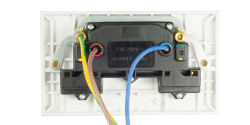

The government has amended Part P of the Building Regulations for England, reducing the amount of work that requires Part P certification.
Under the new changes, electrical work carried out in kitchens, or outdoors, is no longer covered by Part P unless a new circuit is required.
The second major change relates to the use of a registered third party to certify notifiable work, as an alternative to using a building control body. Previously, an electrical contractor undertaking work covered by Part P, but who was not themselves registered with a competent persons’ scheme, was required to notify their local authority’s building control – who could then determine if the work was acceptable under the regulations.
The Electrical Safety Council (ESC) has welcomed the government's approach to amending Part P, but has also expressed some concerns regarding the changes.
Phil Buckle, director general of the ESC, said: "We have appreciated and welcomed the government's concern to make Part P less bureaucratic and more effective; and we have been closely involved in the review of this regulation.
"While we support the amendment allowing a registered third party to certify notifiable work – which we believe will reduce time, costs and inconvenience to both the consumer and the contractor – we consider it imperative that this is properly policed in order to be effective, and that the public are made fully aware of Part P and its requirements.
"We are disappointed with the proposed reductions in notifiable work. Both statistical data and anecdotal evidence indicates that kitchens and outdoors are high-risk areas, so any electrical work must be of a particularly high standard. Given that Part P is the only legislation which protects the individual within their home, we would argue that notifiable installations should continue to include kitchens and outdoors.
"We understand that the regulation will be revised in two years' time and we hope government will be inclined to gather evidence on the safety implications of the amendments to Part P."
If you'd like to keep up-to-date with the latest developments in the heating and plumbing industry, why not subscribe to our weekly newsletters? Just click the button below and you can ensure all the latest industry news and new product information lands in your inbox every week.